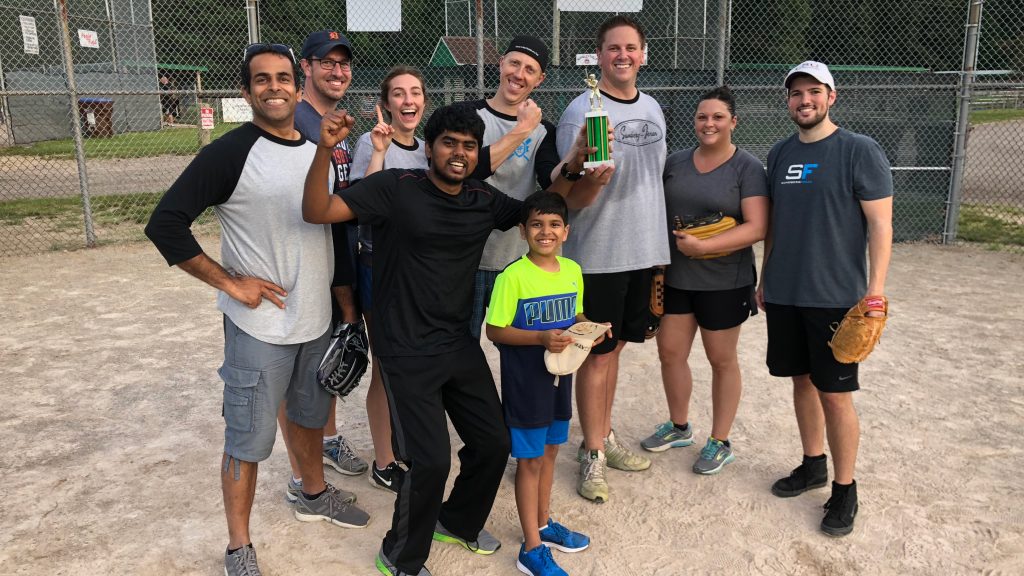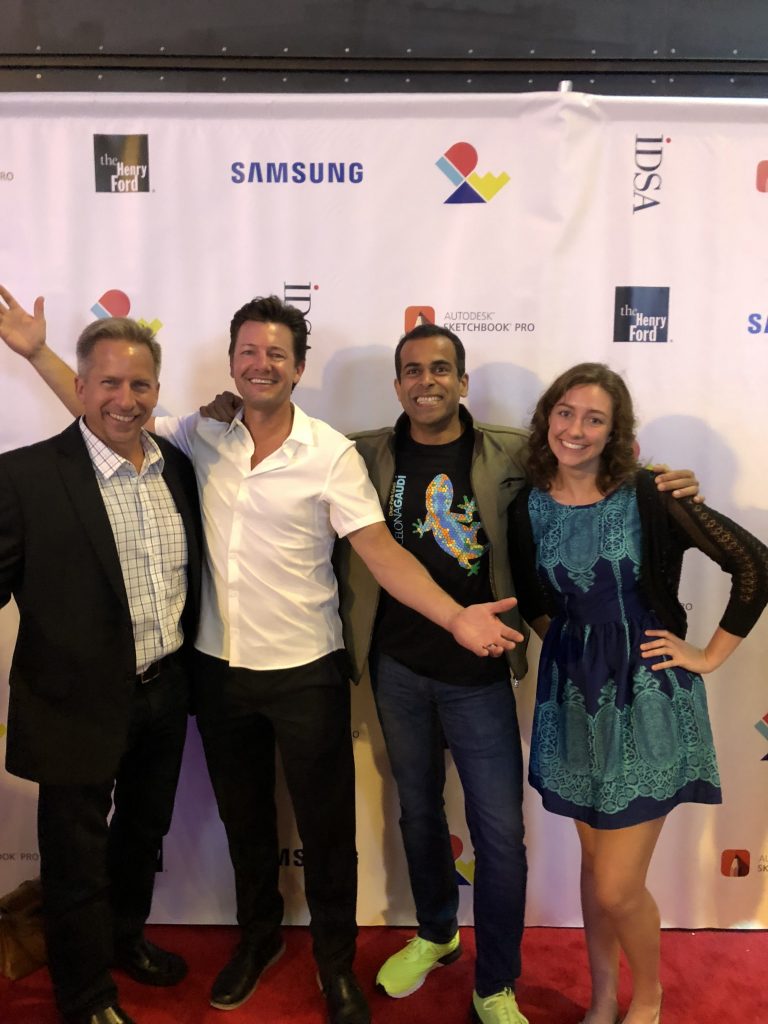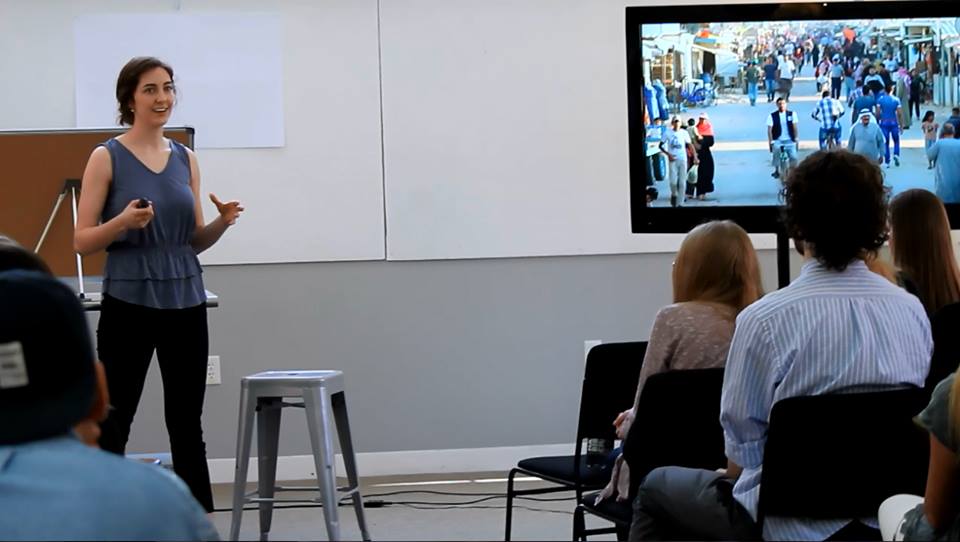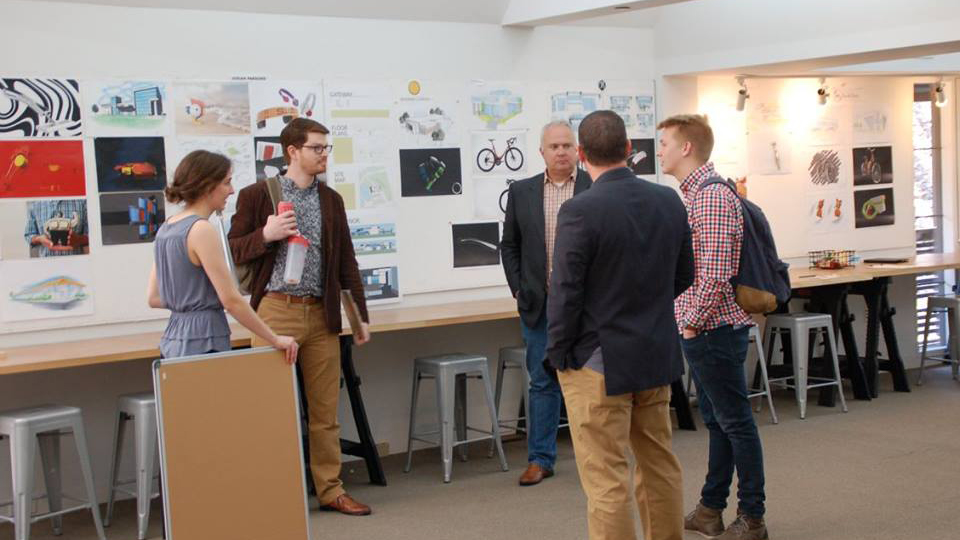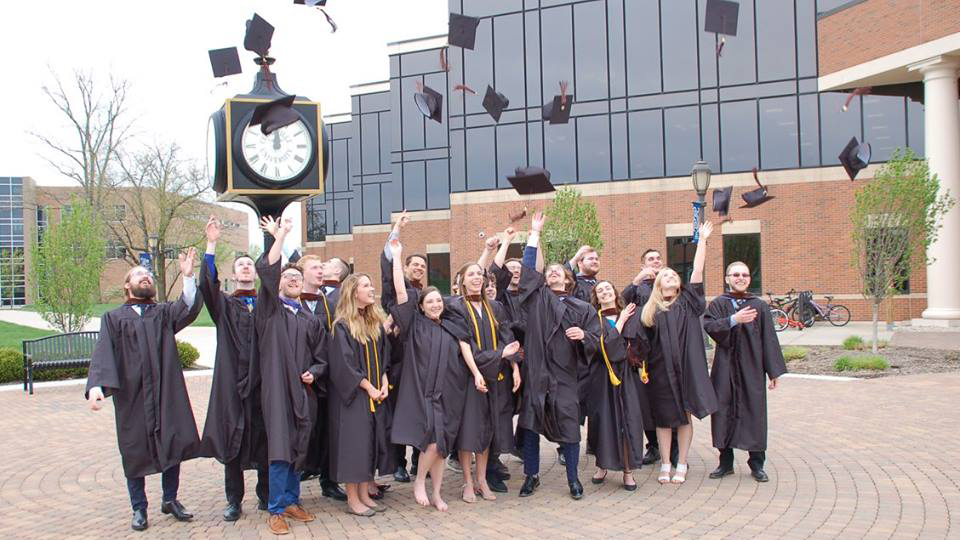
When we are students, our exposure to the professional design world can be limited. With any luck, we make it to a couple conferences or get an internship that introduces us to what lies beyond our comfy embryonic bubble of academia. But if your design program was like mine, the grueling schedule and project load can make it difficult – not to mention that pushing yourself into the blinding daylight of the “real world” is not comfy. So whether for lack of time, bravery or personal motivation, students know we may be in for a rude awakening once – never to forget the terrifying question of IF we get jobs after graduation. We peer through the fourth-dimensional portal of graduation with awe and trepidation while professionals; if they happen to glance backward at all, meet us with placid, confident eyes. Professionals seem to us like embodiments of knowledge that is simply unattainable to us on the other side.
However. Having, successfully graduated and taken a job within the last two months, I am in the blessed position of being able to personally reflect on the crazy transition from being a student to being a “professional”. If there is any student out there who is wondering what to expect in the first couple months of their big girl or big boy job, or if there is any seasoned professional who deigns to spare a couple minutes for a chuckle at what might mirror their own retrospective, I bid you to consider here what offering of advice can come from a two-month-old professional.
Lesson 1: “You can’t script it.”
In school, I was preoccupied with figuring out how to set myself apart as a desirable employee and secure a good job. I lived with the nagging fear that I would never be able to finally achieve this after all the hard work I had invested… or that I would end up with a job that I hated – or worse, one that wasn’t even related to design, which I had grown to love. With regard to what will happen after school, while you can make provision for the future, you cannot ultimately know or control what will happen. This is a scary thought, but hopefully my story will encourage you:
As a student, I felt like an imposter in my field for much of the time because – and I’m still somewhat embarrassed to admit it – I didn’t actually know what industrial design was before I chose the major. When I started college, I didn’t see any clear path that I should take. I could find enjoyment in almost everything I had pursued up to that point, and I chose to major in Journalism not because I had a burning passion for it, but because I thought this option was as good as any and better than most.
What that tipped me in that direction was that of any of my interests, writing and learning about people, their stories, and building relationships with them were things in which I had never really had to discipline myself. Writing and people were two things in which I naturally invested my time. I figured that by majoring in Journalism, I could get myself to a place where I could do this for a living – traveling around, getting to know people, and telling their stories.
Once I started my education, I quickly decided Journalism was not what I wanted to do, and I fell upon Industrial Design at the end of my freshman year in the process of figuring out another direction. It seemed to combine a lot of my creative and other-oriented interests. So with no background or previous knowledge of design, and with very little idea as to what I was getting myself into, I dove in.
Now, as Marketing and Communications Designer for Sundberg-Ferar, the Detroit-native industrial design studio born in 1934, I get to use the skills I learned as a designer to creatively tell the story of second longest standing independent design studio in the country. And on top of that, most of my job is – you guessed it – writing and building relationships with people, the very strengths that started me on this journey in the first place!
When I graduated with my degree from the International Center for Creativity, listed in the top five ID schools in the country, I was interviewing for an industrial design position for a corporate company and my current position at SF. I had never pictured myself going into marketing and communications, but you know what? Despite never expecting or seeking the position, it has been one of the best things that have ever happened to me.
What I learned from all of this is that you will set yourself apart by who you are. Just by working hard, doing your best and allowing whatever strengths you have to flourish, you will be a designer with the unique set of skills that someone specifically needs – all simply because you’re not like anyone else.
A professor of mine who told me a lot of wise things while I had the pleasure of learning from him was James D. Orr, (former Design Director for GM brands Chevrolet, Pontiac, Oldsmobile, and Cadillac). When I called to tell him I had gotten a job and the unexpected nature of it, one of the things I remember him saying to me was “You can’t script these things”. This has been incredibly true in my experience. While I could never have scripted the events of my life up to this point, I am very thankful for where they have taken me.
Lesson 2: “You’re probably worrying too much.”
When I entered the professional world, the knowledge that I was no longer a student made me feel that now I somehow had to be better than when I was a student. What I’ve learned instead is that what comes after you’ve started a job is more of a continuation of what you did as a student. All the scary professional people are still just people, and you need to consciously chill and let yourself enjoy it.
The first networking event I went to, as a professional, was a fascinating presentation and panel hosted by Autoline’s John McElroy on the mobility disruption. While I love all kinds of industrial design, I have never been the most savvy in automotive. The people in attendance here were mostly twice my age and had been in automotive their whole lives. It was certainly a battle to strike up conversations with strangers in that environment. I was feeling out of place and was choosing every moment to keep my game face on.
Then I had the pleasure of meeting Doron Levin, long-time Detroit-based freelance journalist and host of SiriusXM’s Insight 121. He asked me about how my first job was going, and I gave a diplomatic answer summarizing my feelings of mingled excitement and being overwhelmed. To this, he lightly replied, “you’re probably worrying too much”.
I was a taken slightly aback by his lack of concern given what I saw as a big deal. Then I realized it wasn’t lack of concern, but perspective. Where I was a week on the job and everything seemed like life or death, he was decades in. It made me realize that a job, whether you’re a noob like me, or a veteran like him, is nothing more than showing up day after day and doing the best you can. It’s not rocket science. And you can (and should) have a little fun with it!
Lesson 3: Be prepared to be trusted
The first couple weeks of my job – actually, what am I saying? It still feels like this sometimes! It was terrifying that with no previous training in the marketing and communications field, I was suddenly trusted to handle much of the company’s outward facing content. In my head I was often thinking “You mean I just do this work you’ve given me, and you’re trusting me to get it done and get it done well and represent the company?!” And the answer is, yes.
Thankfully, as students, this is exactly what we’ve been preparing ourselves for in our educations. Gabe Pyle and Trayton Ojala, two professors of mine who worked with us everyday, always made us very aware that our work was more important than just ourselves. Through collaborations with outside companies and daily verbal reminders, we were shown that even as students, our work represented our school. Not only that, but our work would soon directly affect the quality of our or someone else’s life, the success or failure of a product, the reputation of our team, and our client’s business. In our program, we were also used to being thrown in the deep end. That is, being given a design brief and our professors as resources, but never being told explicitly how to achieve the goal. We were used to having to figure it out.
Even with this stellar preparation to shoulder responsibility and trust for my work, I still have to get used to the reality of it. At work, when faced with the nonchalance of my superiors as they trust me with their brand, I often bite my tongue to keep from saying something stupid like: “aren’t you at all nervous to trust me?! Don’t you know I literally just graduated and I’ve never done anything this high stakes?”
But almost as soon as I think that, I realize: It’s really not as high stakes as I think. Nothing about how I work has really changed since school. The world will not stand or fall on your work in a moment. But always, whether with school or your career, the world will stand or fall on your commitment to good work over time. If you are trustworthy with little, you will be trustworthy with much, so do everything with integrity right now, trust in your preparation, and when the time comes, you’ll be ready to be trusted.
Lesson 4: Learn and re-learn humility
You’d think it would be super easy to be humble in your first job out of school where you’re the youngest full time employee at your company and you’re doing a job you weren’t specifically trained for. But against all logic, and even as you observe with horror, pride still rears its ugly head! What you do with that tendency is the important part. My dad, Stephen, repeatedly gave me this necessary advice during the first couple weeks of my job: “Practice humility!”
As a new employee, you can expect heavy critique on a daily basis. This is an indispensible part of learning, and I would say you should be concerned if that’s not the case. Through my experience in school, I learned to prize critique like gold because every critique is an opportunity to grow. Yet, in a new environment when my work is under scrutiny, I don’t think I am alone when I admit that my jerk response is to forget humility and defend myself.
BUT. When you feel the urge to speak your mind concerning all the reasons behind your work and thought process, wait! Here are some questions I try ask myself before I speak: Are you listening to what they’re saying? Are you remembering their wealth of experience compared to your own? Is this about your pride, or the work? Are you focused primarily on being understood and appreciated, or are you focused on the execution of the task at hand and the good of the team?
At Sundberg-Ferar, I am very thankful to be on a team of incredibly gifted and experienced creatives who are far ahead of me in life and design. They are able to give me all the sound critique I could ever hope for! So, when you graduate and get a sweet job, stay humble and treat the critique of your colleagues like gold.
Lesson 5: Own your work because, “if you’re not uncomfortable, you’re not growing.”
Once you’re a professional, you can’t hide behind “I’m a student” anymore. You have to take ownership of your work. This feels terrifying, but it’s really best thing that can happen. Real improvement only starts when you’re able to say, “whether it’s good or bad or whatever it is, I made this, and this is what I’m capable of”. Admitting this is brave, it is humbling, and it’s also the best place to be in order to truly learn.
Two of my mentors at the ICC, Jim Stevenson and Tom Balliett always said, “If you’re not uncomfortable you’re not growing”. The most hard and scary times of my life have always been the times that I’ve grown the most. If you run to avoid discomfort or fear, it will find you wherever you go, and you pass by incredible opportunities in the process. The only way out is through.
I started having to take ownership of my work like this when I attended and presented at the 2018 IDSA Central District Conference at Columbus College of Art and Design. Looking professionals in the eyes and presenting your work to them takes away all the safeties of “I’m a student, my work isn’t real yet”. It is real. The sooner you can take responsibility for who you are and what you produce in a high stakes environment, the sooner you give others the opportunity to help you by giving good critique.
Lesson 6: You don’t know what you don’t know. Just start asking questions about anything and everything.
After being encouraged and trained in curiosity for four years of a design degree, I thought I was very good at asking the right questions. But since starting this job, I’ve realized I still wasn’t as good as I thought. There’s a big difference between the head knowledge of knowing you should ask lots of questions, and actually doing it. What if you don’t even know what you don’t know? How do you know what questions to ask?
I have had to become much more aware of when I’m unsure about something, which is actually very hard work. Often I’m caught up short when I show my work to my colleague, Jeevak, and it turns out to not be what he was expecting at all. I have this “oh crap” moment where I realize that what I understood from him and what he meant were two very different things. That’s when I realize that I actually had been a little foggy on what he wanted, but hadn’t had the awareness of my own uncertainty in order to clarify with him.
When you get into the work force, your superiors expect you to ask questions. They get nervous if you don’t ask questions. They expect you to make mistakes, and fail. I am so thankful that Jeevak is always very gracious and patient with me. Every time this happens, I get a little bit better at understanding what pittfalls I need to be wary of and how to ask the right questions. My advice is, just ask a ton of questions any and every time you get the chance because you don’t know what you don’t know.
In conclusion:
In my final semester of college, I was going through some heavy personal trials, and with all the pressures of school, graduation and job-hunting, I was convinced that the outcome of it all would be inevitably dismal. I thought I would deliver a crappy capstone presentation, have no job prospects upon graduation, and flounder around hopelessly for a couple of months before being deported back to my hometown on the South-East coast of Canada where prospects of getting a design job would be even more dire. But the reality I am living now is starkly different from that.
I graduated having presented a successful capstone project, and even having won some design competitions. And now I do have a job. At Sundberg-Ferar, I have the amazing privilege of learning from some of the best design professionals in the nation at the second longest standing independent design studio in the nation. I honestly thought I would graduate hopeless and feel like my life was ending. Instead, sometimes I really feel that I have to pinch myself. I have been so blessed and I could never have imagined where I would be today.
There is a song that I find ridiculously inspiring. Don’t laugh, but it’s from a Barbara Streisand movie about a young polish woman in the 1870s who longs for the education that is forbidden to women. At the end of the movie, she leaves for America in the hope that she can pursue the education she longs for, and she sings the finale song “A piece of sky”.
I hope the words of this song encourage you. They embody what I feel now on this side of the transition from student to “professional”. If you honestly believe the future will be dismal for you, these words are for you. Don’t give up! You’re almost there!
It all began the day I found
That from my window I could only see
A piece of sky
I stepped outside and looked around
I never dreamed it was so wide
Or even half as high
The time had come
To try my wings
And even thought it seemed at any moment I could fall
I felt the most
Amazing things
The things you can’t imagine
If you’ve never flown at all
Though it’s safer to stay on the ground
Sometimes where danger lies
There the sweetest of pleasures are found
No matter where I go
There’ll be memories that tug at my sleeve
But there will also be
More to question, yet more to believe
The more I live, the more I learn
The more I learn, the more I realize
The less I know
Each step I take
Each page I turn
Each mile I travel only means
The more I have to go
What’s wrong with wanting more?
If you can fly, then soar!
With all there is, why settle for
Just a piece of sky?

